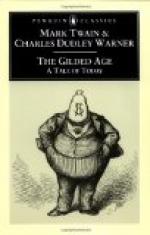CHAPTER LXII
Philip Sterling’s circumstances were becoming straightened. The prospect was gloomy. His long siege of unproductive labor was beginning to tell upon his spirits; but what told still more upon them was the undeniable fact that the promise of ultimate success diminished every day, now. That is to say, the tunnel had reached a point in the hill which was considerably beyond where the coal vein should pass (according to all his calculations) if there were a coal vein there; and so, every foot that the tunnel now progressed seemed to carry it further away from the object of the search.
Sometimes he ventured to hope that he had made a mistake in estimating the direction which the vein should naturally take after crossing the valley and entering the hill. Upon such occasions he would go into the nearest mine on the vein he was hunting for, and once more get the bearings of the deposit and mark out its probable course; but the result was the same every time; his tunnel had manifestly pierced beyond the natural point of junction; and then his, spirits fell a little lower. His men had already lost faith, and he often overheard them saying it was perfectly plain that there was no coal in the hill.
Foremen and laborers from neighboring mines, and no end of experienced loafers from the village, visited the tunnel from time to time, and their verdicts were always the same and always disheartening—“No coal in that hill.” Now and then Philip would sit down and think it all over and wonder what the mystery meant; then he would go into the tunnel and ask the men if there were no signs yet? None—always “none.”
He would bring out a piece of rock and examine it, and say to himself, “It is limestone—it has crinoids and corals in it—the rock is right” Then he would throw it down with a sigh, and say, “But that is nothing; where coal is, limestone with these fossils in it is pretty certain to lie against its foot casing; but it does not necessarily follow that where this peculiar rock is coal must lie above it or beyond it; this sign is not sufficient.”
The thought usually followed:—“There is one infallible sign—if I could only strike that!”
Three or four tines in as many weeks he said to himself, “Am I a visionary? I must be a visionary; everybody is in these days; everybody chases butterflies: everybody seeks sudden fortune and will not lay one up by slow toil. This is not right, I will discharge the men and go at some honest work. There is no coal here. What a fool I have been; I will give it up.”
But he never could do it. A half hour of profound thinking always followed; and at the end of it he was sure to get up and straighten himself and say: “There is coal there; I will not give it up; and coal or no coal I will drive the tunnel clear through the hill; I will not surrender while I am alive.”




